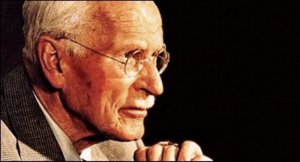8 Personality Types, According to Carl Jung

Carl Gustav Jung is without a doubt an essential name if we want to understand the history of psychology. His theories have been the source of as much controversy as inspiration. It’s no wonder he is the founder of his own school of thought within the psychoanalytic field, the school of analytic psychology, also called psychology of the complexes and deep psychology.
For a long time, Jung was Freud’s disciple. However, he distanced himself from Freud mainly because he didn’t agree with his theory of sexuality. Moreover, Jung postulated the existence of a “collective unconscious,” which is prior to the individual unconscious.
“I know what I want: I have goals and opinions. Let me be myself, that’s more than enough for me.”-Anne Frank-
Jung was a restless intellectual, and gathered information from many different sources. Besides neurology and psychoanalysis, Jung’s theories were influenced by mythology, religion and even parapsychology. One of his great passions was archaeology, and that’s probably were his theory of archetypes originated. A theory of universal symbols which are present in the unconscious human mind.
Jung’s personality type theory
For Carl Jung, there are four basic psychological functions: to think, feel, sense and perceive. In each and every person, one or more of these functions have particular emphasis. For example, when someone is impulsive, according to Jung, this is due to the fact that their “sense and perceive” functions predominate over the “feel and think” functions.

Based on these four basic functions, Jung postulated that there are two main types of character: the introvert and the extrovert. Each one has specific traits, which differentiate it from the other.
Extrovert character
The extrovert type is characterized by the following traits:
- Their interests focus on the external reality, instead of their internal world.
- They make decisions by thinking about their effect on the external reality, instead of on their own existence.
- Their actions are carried out according to what others might think about them.
- Their ethics and morals are built depending on what prevails in the world.
- They are people that can fit into almost any environment, but have a hard time truly adapting.
- They are suggestible, easily influenced and tend to imitate others.
- They need to be seen and acknowledged by others.

Introvert character
On the other hand, the introvert type has the following traits:
- They are interested in themselves, their feelings and thoughts.
- They orient their behavior according to what they feel and think, though it may go against the external reality.
- They don’t worry too much about the effect their actions might have on their surroundings. They worry about everything that satisfies them internally.
- They struggle to fit into and adapt to their environment. However, if they manage to adapt, they will do so in a creative and complete way.
Types of personalities
Based on the four basic psychological functions and the two types of fundamental characters, Jung affirms that eight distinct personality types can be described. Everyone belongs to one of these types or another. They are as follows:
Reflexive extrovert
The reflexive extrovert personality corresponds with the objective brainy individuals, whose actions are almost exclusively based on reason. They only accept as true the things that they can confirm with enough evidence. They are not very sensitive and can even be tyrannical and manipulative towards other people.
Reflexive introvert
The reflexive introvert is a person with great intellectual activity, but who, however, has difficulties relating or interacting with other people. They tend to be stubborn and tenacious when it comes to achieving their objectives. Sometimes they are seen as misfits and harmless, yet interesting.
Sentimental extrovert
The people who fall into this category have a great ability to understand others and establish social relationships. However, they struggle to separate themselves from the herd and suffer when they are ignored by the people around them. They are very skilled at communication.
Sentimental introvert
The sentimental introvert personality type corresponds with solitary people who have great difficulty establishing social relationships with other people. They can be unsociable and melancholy. They do everything within their power to go unnoticed, and they like to remain silent. However, they are very sensitive to the needs of others.

Perceptive extrovert
Perceptive extrovert individuals have a special weakness for objects, to which they can even attribute magical qualities, though they may do so unconsciously. They aren’t passionate about ideas, but rather about the way these ideas take the shape of concrete things. They seek out pleasure above all things.
Perceptive introvert
It’s a type of personality commonly found in artists and musicians. Perceptive introvert people put special emphasis on sensory experiences. They give color, shape and texture great value. They belong to the world of shapes as a source of internal experiences.
Intuitive extrovert
This corresponds to the typical adventurer. Intuitive extroverts are very active and restless. They need a lot of stimuli all of the time. They are tenacious when it comes to achieving their objectives, and once they do, they go right on to the next goal quickly forgetting the previous one. They don’t care much about the well-being of those around them.
Intuitive introvert
These people are extremely sensitive to the most subtle stimuli. Intuitive introverts correspond to the type of people who can almost guess what others are thinking, feeling or willing to do. They are imaginative, dreamers and idealists. They struggle with “keeping their feet on the ground.”

Carl Gustav Jung is without a doubt an essential name if we want to understand the history of psychology. His theories have been the source of as much controversy as inspiration. It’s no wonder he is the founder of his own school of thought within the psychoanalytic field, the school of analytic psychology, also called psychology of the complexes and deep psychology.
For a long time, Jung was Freud’s disciple. However, he distanced himself from Freud mainly because he didn’t agree with his theory of sexuality. Moreover, Jung postulated the existence of a “collective unconscious,” which is prior to the individual unconscious.
“I know what I want: I have goals and opinions. Let me be myself, that’s more than enough for me.”-Anne Frank-
Jung was a restless intellectual, and gathered information from many different sources. Besides neurology and psychoanalysis, Jung’s theories were influenced by mythology, religion and even parapsychology. One of his great passions was archaeology, and that’s probably were his theory of archetypes originated. A theory of universal symbols which are present in the unconscious human mind.
Jung’s personality type theory
For Carl Jung, there are four basic psychological functions: to think, feel, sense and perceive. In each and every person, one or more of these functions have particular emphasis. For example, when someone is impulsive, according to Jung, this is due to the fact that their “sense and perceive” functions predominate over the “feel and think” functions.

Based on these four basic functions, Jung postulated that there are two main types of character: the introvert and the extrovert. Each one has specific traits, which differentiate it from the other.
Extrovert character
The extrovert type is characterized by the following traits:
- Their interests focus on the external reality, instead of their internal world.
- They make decisions by thinking about their effect on the external reality, instead of on their own existence.
- Their actions are carried out according to what others might think about them.
- Their ethics and morals are built depending on what prevails in the world.
- They are people that can fit into almost any environment, but have a hard time truly adapting.
- They are suggestible, easily influenced and tend to imitate others.
- They need to be seen and acknowledged by others.

Introvert character
On the other hand, the introvert type has the following traits:
- They are interested in themselves, their feelings and thoughts.
- They orient their behavior according to what they feel and think, though it may go against the external reality.
- They don’t worry too much about the effect their actions might have on their surroundings. They worry about everything that satisfies them internally.
- They struggle to fit into and adapt to their environment. However, if they manage to adapt, they will do so in a creative and complete way.
Types of personalities
Based on the four basic psychological functions and the two types of fundamental characters, Jung affirms that eight distinct personality types can be described. Everyone belongs to one of these types or another. They are as follows:
Reflexive extrovert
The reflexive extrovert personality corresponds with the objective brainy individuals, whose actions are almost exclusively based on reason. They only accept as true the things that they can confirm with enough evidence. They are not very sensitive and can even be tyrannical and manipulative towards other people.
Reflexive introvert
The reflexive introvert is a person with great intellectual activity, but who, however, has difficulties relating or interacting with other people. They tend to be stubborn and tenacious when it comes to achieving their objectives. Sometimes they are seen as misfits and harmless, yet interesting.
Sentimental extrovert
The people who fall into this category have a great ability to understand others and establish social relationships. However, they struggle to separate themselves from the herd and suffer when they are ignored by the people around them. They are very skilled at communication.
Sentimental introvert
The sentimental introvert personality type corresponds with solitary people who have great difficulty establishing social relationships with other people. They can be unsociable and melancholy. They do everything within their power to go unnoticed, and they like to remain silent. However, they are very sensitive to the needs of others.

Perceptive extrovert
Perceptive extrovert individuals have a special weakness for objects, to which they can even attribute magical qualities, though they may do so unconsciously. They aren’t passionate about ideas, but rather about the way these ideas take the shape of concrete things. They seek out pleasure above all things.
Perceptive introvert
It’s a type of personality commonly found in artists and musicians. Perceptive introvert people put special emphasis on sensory experiences. They give color, shape and texture great value. They belong to the world of shapes as a source of internal experiences.
Intuitive extrovert
This corresponds to the typical adventurer. Intuitive extroverts are very active and restless. They need a lot of stimuli all of the time. They are tenacious when it comes to achieving their objectives, and once they do, they go right on to the next goal quickly forgetting the previous one. They don’t care much about the well-being of those around them.
Intuitive introvert
These people are extremely sensitive to the most subtle stimuli. Intuitive introverts correspond to the type of people who can almost guess what others are thinking, feeling or willing to do. They are imaginative, dreamers and idealists. They struggle with “keeping their feet on the ground.”

This text is provided for informational purposes only and does not replace consultation with a professional. If in doubt, consult your specialist.







